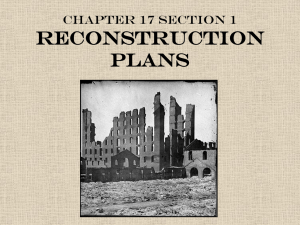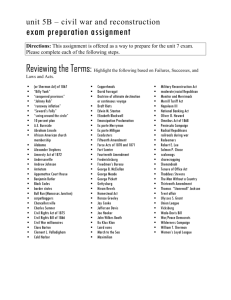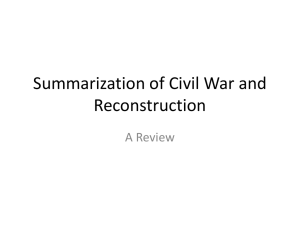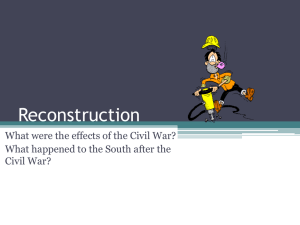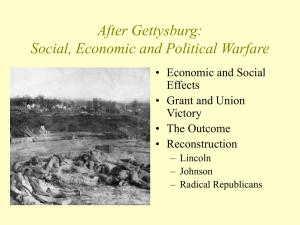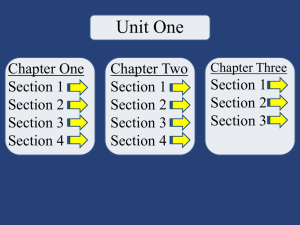The American Civil War
advertisement
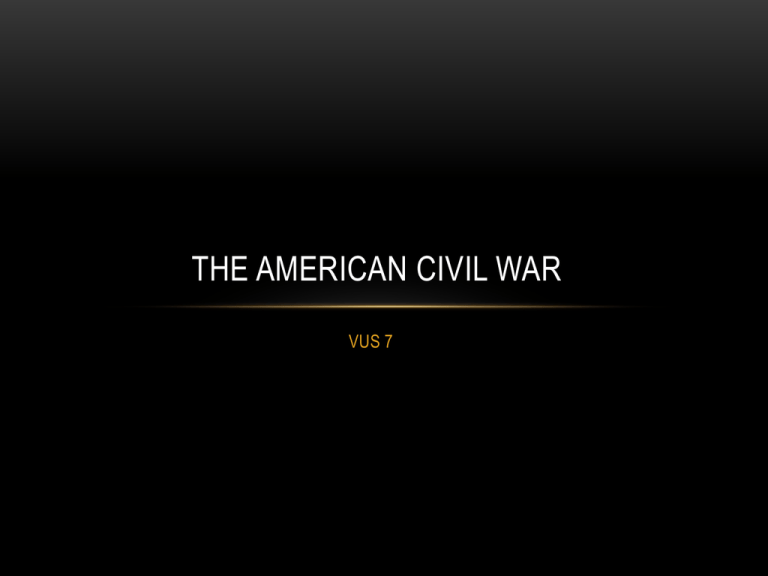
THE AMERICAN CIVIL WAR VUS 7 WHAT DO YOU KNOW ABOUT… • The American Civil War? Write out five things you already know about the war. • Tell me five things you hope to learn during this unit on the War and Reconstruction CAUSES OF THE WAR • Sectional disagreements and debates over tariffs, extension of slavery into the territories, and the nature of the Union (states’ rights) • Northern abolitionists versus Southern defenders of slavery • US Supreme Court case Dred Scott • Publication of Uncle Tom’s Cabin by Harriet Beecher Stowe CAUSES OF THE WAR • Ineffective presidential leadership in the 1850s • A series of failed compromises over the expansion of slavery in the territories • President Lincoln’s call for federal troops in 1861. MAJOR EVENTS IN THE BEGINNING • Lincoln is elected in 1860, sparking a series of southern secessions. South Carolina will be the first in December 1860. • Shots fired on Fort Sumter, 12 April 1861-opening confrontation in the War. • Manassas (Bull Run) will be the first major battle of the war, just outside of Washington DC KEY PLAYERS • Abraham Lincoln-President of the United States during the Civil War, who insisted the Union would be held together-by force if necessary. • “‘A house divided against itself cannot stand.’ I believe this government cannot endure, permanently half slave and half free. I do not expect the Union to be dissolved -- I do not expect the house to fall -- but I do expect it will cease to be divided. It will become all one thing or all the other.” JEFFERSON DAVIS • US Senator who became president of the Confederate States of America ULYSSES S. GRANT • Union military commander who won victories over the South after several other Union commanders had failed. ROBERT E. LEE • Confederate General of the Army of Northern Virginia • Lee opposed secession, but did not believe the Union should be held together by force. • Urged Southerners to accept defeat and unite as Americans again, when many Southerners wanted to fight on after Appomattox FREDERICK DOUGLASS • Former enslaved African American who became a prominent abolitionist who urged Lincoln to recruit former enslaved African Americans to fight in the Union army THE WAR’S COURSE • Following the Battle of Manassas, many recognized the war would not be over in a few weeks. • North vs. South • Population • Resources • Anaconda Plan MAJOR BATTLES • Antietam • Chancellorsville • Gettysburg • Fall of Vicksburg • Petersburg Siege • Fall of Richmond EMANCIPATION PROCLAMATION AND • Issued following Battle of Antietam • Made abolition of slavery a Northern aim • Freed those slaves in ‘rebelling’ states • Those Southern states which seceded • Discouraged any interference of foreign governments • Allowed enlistment of African American soldiers GETTYSBURG ADDRESS • Lincoln described the Civil War as a struggle to preserve a nation that was dedicated to the proposition that “all men are created equal” and that was ruled by a government “of the people, by the people, and for the people.” • Lincoln believed America was “one nation” not a collection of sovereign states • Southerners who believed they freely joined and could thus freely leave, were placed in this category. POLITICAL LIFE • Lincoln’s view that the United States was one indivisible nation had prevailed • Lincoln believed that since secession was illegal, Confederate governments in the Southern states were illegitimate and the states had never really left the Union. • He believed reconstruction was a matter of quickly restoring legitimate Southern state governments that were loyal to the Union POLITICAL LIFE • Lincoln also believed that to reunify the nation, the federal government should not punish the South, but “act with malice towards none, with charity for all…to bind up the nation’s wounds….” • The assassination of Lincoln a few days after Lee’s surrender at Appomattox enabled Radical Republicans to influence the process of Reconstruction in a manner much more punitive towards former Confederate states. RADICAL REPUBLICANS • Radical Republicans believed seceding states were not to be allowed back into the Union immediately, but put under military occupation. • Radical Republicans also believed in aggressively guaranteeing voting and other civil rights to African Americans. • These clashed repeatedly with Pres. Johnson over civil rights for freed slaves, eventually impeaching him, but didn’t remove him from office. CONSTITUTIONAL AMENDMENTS • 13th Amendment- Slavery permanently abolished in the US • 14th Amendment-States were prohibited from denying equal rights under the law to any American. • 15th Amendment- Voting rights guaranteed regardless of “race, color, or previous condition of servitude” RECONSTRUCTION PERIOD • Ended following a close election in 1876. • In return for support from Southern Democrats in the electoral college, the Republicans agreed to end the military occupation of the South. • The Compromise of 1877 enabled former Confederates who controlled the Democratic party to regain power and opened the door to the “Jim Crow Era”. RICHMOND ATLANTA JIM CROW IN THE SOUTH ECONOMIC IMPACT OF RECONSTRUCTION • Southern states left embittered and devastated by the war; farms, railroads, and factories had been destroyed throughout the South. • Confederate money: worthless • Towns and cities such as Richmond and Atlanta lay in ruins • South would remain an agriculture based economy and poorest section of country for years to come ECONOMIC IMPACT OF RECONSTRUCTION • North and Midwest • Emerged as strong and growing economies, laying the foundation for the sweeping industrialization of the nation. • Transcontinental Railroad • Completed soon after the war ended, intensified the westward movement of settlers into the states between the Mississippi and Pacific Ocean PROMONTORY, UT (OR STRASBURG, CO) AND A GOLDEN SPIKE! HOW DID THE CIVIL WAR AFFECT AFRICAN AMERICANS AND THE COMMON SOLDIER? • The Emancipation Proclamation allowed the enlistment of African American soldiers. • Common Soldiers • Warfare often involved hand-to-hand combat • Diaries reveal the harsh realities of combat • Often soldiers returned to destroyed homes and poverty and many would live with permanent disabilities. POST-WAR LEADERS • Ulysses S. Grant • Urged Radical Republicans not to be harsh with former Confederates, was elected President and served during much of Reconstruction and Grant opposed retribution directed towards the South. POST WAR LEADERS • Robert E. Lee • Urged Southerners to reconcile and rejoin the United States. • Served as President of Washington College (today Washington and Lee College) • Emphasized the importance of education to the nation’s future POST WAR LEADERS • Frederick Douglass • Supported full equality for African Americans • Advocated the passage of the 14th and 15th Amendments • Encouraged Federal government’s action to protect the rights of freedmen in the south • Served as ambassador to Haiti and in the civil service.


